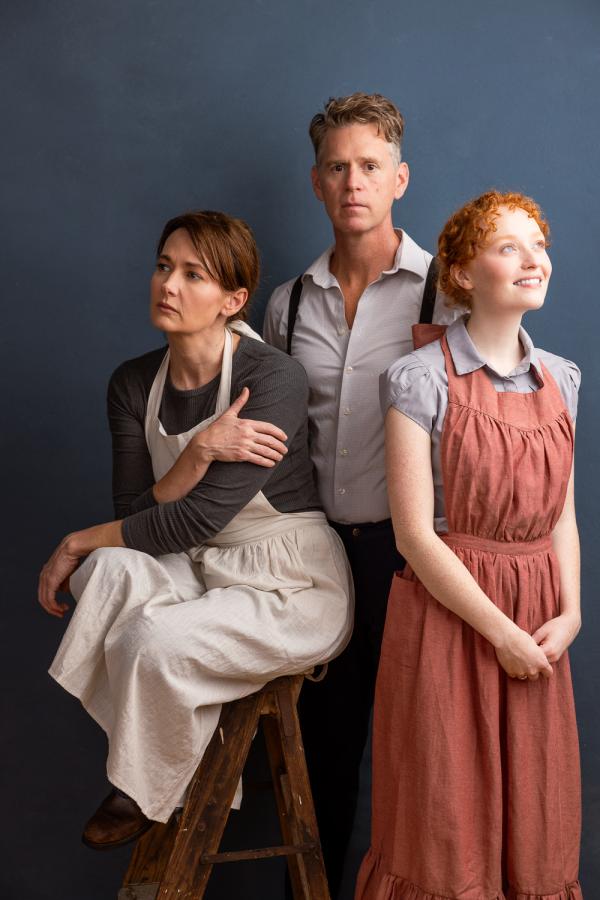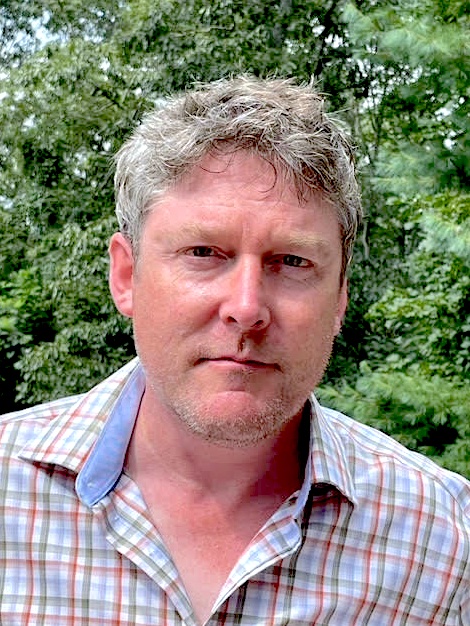February 24, 2024

Aimee Doherty, Michael Kaye, and Kate Fitzgerald in “Thirst” Nile Hawver/Nile Scott Shots
Eugene O’Neill’s classic drama “Long Day's Journey Into Night” follows one devastating day in the life of the Tyrone family. Set in 1912 in the family’s Connecticut summer home, the highly autobiographical Pulitzer Prize-winning play reveals a family shattered by addiction, disease, and desperation.
Meanwhile, offstage in the kitchen of the same house, there’s an equally compelling drama unfolding with the staff – two Irish immigrant maids and an American chauffeur.
That’s the story that is captured in “Thirst,” Ronán Noone’s compelling look into the Irish immigrant experience and the search for love, serenity, and a place to call home in a new world. The play runs at Lyric Stage through March 17.
Aimee Doherty plays Bridget, “a disappointed cook whose shuttered heart only blooms when she has a bottle in her hand;” Kate Fitzgerald is Cathleen, “a vibrant young summer maid – also known as ‘the second girl’ – who survived a trip on the Titanic;” and Michael Kaye is Jack the chauffeur, who’s hiding a troubled past.
Of the three, only Cathleen appears in “Long Day’s Journey.” And O’Neill does not present her in a very flattering light. The other two are referenced but never seen.
Ronán Noone first brought the three characters to life in “The Second Girl,” which played The Huntington Theatre in 2015. Although the production was well-received by audiences, he was not satisfied with the tone of the story he was telling. In hindsight, he found it too woeful.
It was his friend and colleague playwright Theresa Rebeck who encouraged him to reimagine the story. She assured him there was untapped joy there in sharp contrast to the misery of the Tyrone family. And so, he went back to work.
Rebeck subsequently directed a production of the new piece, entitled “Thirst” – which Ronán happily terms “a separate work of art” – at the Dorset Theatre Festival in Vermont in 2022.
In the audience at Dorset was Lyric’s Artistic Director Courtney O’Connor, who immediately knew it was perfect for Lyric’s audiences. Courtney is directing the production at Lyric and says she felt a special affinity for the play.
“This is a story near and dear to my heart,” she has said, “as I honor the journey of my own great-grandmother leaving Ireland to pursue a life in America.”
Ronán Noone is a graduate of the University of Galway who emigrated from Ireland (Clifton) in 1994. H e has written 11 full-length plays that have been produced in theaters across the United States, including 4 off-Broadway productions. “Thirst” is his twelfth play. He is a recipient of the Elliot Norton Award and three IRNE Awards. With a full work schedule, he teaches at Walnut Hill School for the Arts and is an assistant professor (adjunct) at Boston University’s MFA Playwriting program. He and his wife and their two daughters make their home on the South Shore.
e has written 11 full-length plays that have been produced in theaters across the United States, including 4 off-Broadway productions. “Thirst” is his twelfth play. He is a recipient of the Elliot Norton Award and three IRNE Awards. With a full work schedule, he teaches at Walnut Hill School for the Arts and is an assistant professor (adjunct) at Boston University’s MFA Playwriting program. He and his wife and their two daughters make their home on the South Shore.
Ronán and I recently discussed the metamorphosis of “Thirst.” Here’s an edited look at our conversation:
RJD. I saw “The Second Girl” at The Huntington and found the characters and the setting very engaging. On a side note, I still have the sensory memory of the Cathleen character actually cooking breakfast on stage and the smell of bacon and eggs wafting into the house. Were you unhappy with it all?
RN. Lugubrious, that’s the term I think about. I found the story full of grief, too much grief. There was enough grief in “Long Day’s Journey Into Night.” It represented both Irish Americans and Irish immigrants, and sadly, I thought. Having lived here over 20 years, yes, there is grief in our lives, but I also found an awful lot of joy in coming to America. I found a lot of immigrants who have joy, who have succeeded, who have found a place for their ambition . . .
I wanted “Long Day’s Journey” to be in conversation with “Second Girl,” and I had to reinvent it to have two ideas in conflict with each other. The grief, the function of one side, with the joy and a kind of appreciation of what immigration can mean for somebody. Starting a new life. I wanted to bring that back to it. I couldn’t find that in “The Second Girl.”
RJD. Even back then, I recall your talking about O’Neill’s condescending attitude to Cathleen, the Irish second girl in the kitchen.
RN. In the first ten pages of Act Three of “Long Day’s Journey,” Cathleen is referred to as stupidly ignorant or silly. Ten times. Part of it, too, was wanting to take back some of that dignity . . . You didn’t get on a boat and come all the way across here because you were stupid. You got on a boat to come over here to try and make a life for yourself.
RJD. My own great-grandmother was in that same position. She came over here in the 1880s, found work as a servant and then brought over other young ladies and found them jobs, too. They were all working hard for a better existence.
RN. When the oldest son got the land, what were you to do? Come over here and try and make a life for yourself as a young woman. That, to me, sounds wildly courageous. Certainly not under the banner of stupidity. And so, with that in mind, it’s so easy for the Irish to find the grief. It’s so easy. And we can wallow in it. And so, the longer I spent in America, the more I realized I was trying to reconcile the Irish-ness that I have with the American-ness that I grew up with over the last 20 years. To try and reconcile that meant you had to find a place where you could see happiness bursting through. Maybe it’s the American dream, or maybe it’s the optimism of it. So let me wallow in that for a while and then let’s bring the two of them together. And out of that came “Thirst.” A thirst for ambition and a thirst to succeed.
RJD. We’re you involved in casting Aimee, Kate, and Michael at Lyric.
RN. Yes, I was involved with Courtney in all casting. And I have to say it’s the most gorgeous bunch I seen cast in some time. I’m expecting some heat on that stage, if I’m allowed to say that.
RJD. You are. The characters come from your own hometown area. Were you inspired by anyone you knew back then?
RN. Oh, my grandmother is all over this play. When I left for America, she sat me down in the front room – which is always the room nobody ever used – and so you go in there, and you go, “Oh-oh, heavy conversation coming.” And she takes out a small packet in her hand. And it’s one of those old hotel button and thread packages. It’s kind of wrapped and she hands it to me and she says, “In there now are threads and buttons for a shirt. Cause when you get to America, you never know when you’d need a button.” I brought that with me, and I still have it.
RJD. She would be very pleased to have inspired you.
RN. Every play I’ve written is a kind of purging of my own spirit. That sounds kind of egotistical but you have to dig into yourself to find what there is. There’s the joy of coming to America to figure out how it works, realize you’re escaping a place where maybe you’re told your station is your duty, and now you can actually become whatever you want to be. That’s the Cathleen character. I have a lot of me in that . . . The antenna is always up and you’re hearing people talking and you’re picking up what they say, and it just stays with you.
RJD. I understand you visited Eugene O’Neill’s grave for inspiration. Most people probably don’t know that O’Neill’s final resting spot is right here in Jamaica Plain.
RN. I did. I thought it was the right thing to do. I had studied O’Neill’s work and never understood it fully when I was younger. And then when I came to America, I started saying, “Oh, I see now how the American Irish think . . . So, I took that time to start rereading his work and seeing exactly where he was coming from. And recognizing the traits of characters I had grown up with, in his work. And so, when I went to his grave it was to say, “I’m taking on this journey with Cathleen, with respect. If you’re okay with that, let me know.” And so, I heard nothing. (Laughing) And so, I took that as okay. And knowing O’Neill’s work. I think along the way, you would have seen him say, “Go on, you do it then. Take it on.”
RJD. And in taking it on, you’ve completely reframed the emotional tone from the ground up to create “Thirst” as a separate work of art.
RN. Yes, but you’ll still smell the bacon.
•••
“Thirst,” through March 17, Lyric Stage Company of Boston. Info: 617-585-5678 or lyricstage.com.

